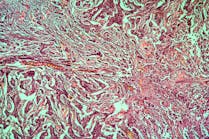People aged 60-80 with low levels of the protein ABCA7 in the brain appear more likely to develop Alzheimer’s disease, according to a new study published in the Journal of Neuropathology & Experimental Neurology.
Researchers at Temple University analyzed levels of the ABCA7 transporter protein responsible for important cellular processes in the brain. An acronym for adenosine triphosphate-binding cassette, subfamily A, member 7, the protein ABCA7 is part of a complex system of proteins that, when dysfunctional, correlates to the kind of neural degeneration and build-up of plaque seen in the progressive stages of Alzheimer’s Disease.
The authors conclude that ABCA7 may function as an effective way to measure risk of developing Alzheimer’s disease, especially for people in their 60s. Furthermore, the study found that high levels of ABCA7 corresponded to remaining cognitively healthy beyond the age of 80, suggesting it could be an attractive target for prevention or treatment of Alzheimer’s.
Alzheimer's Center at Temple University Lewis Katz School of Medicine release on Newswise





